(2019外研版)选修四 unit 1讲义(精讲)
文档属性
| 名称 | (2019外研版)选修四 unit 1讲义(精讲) | 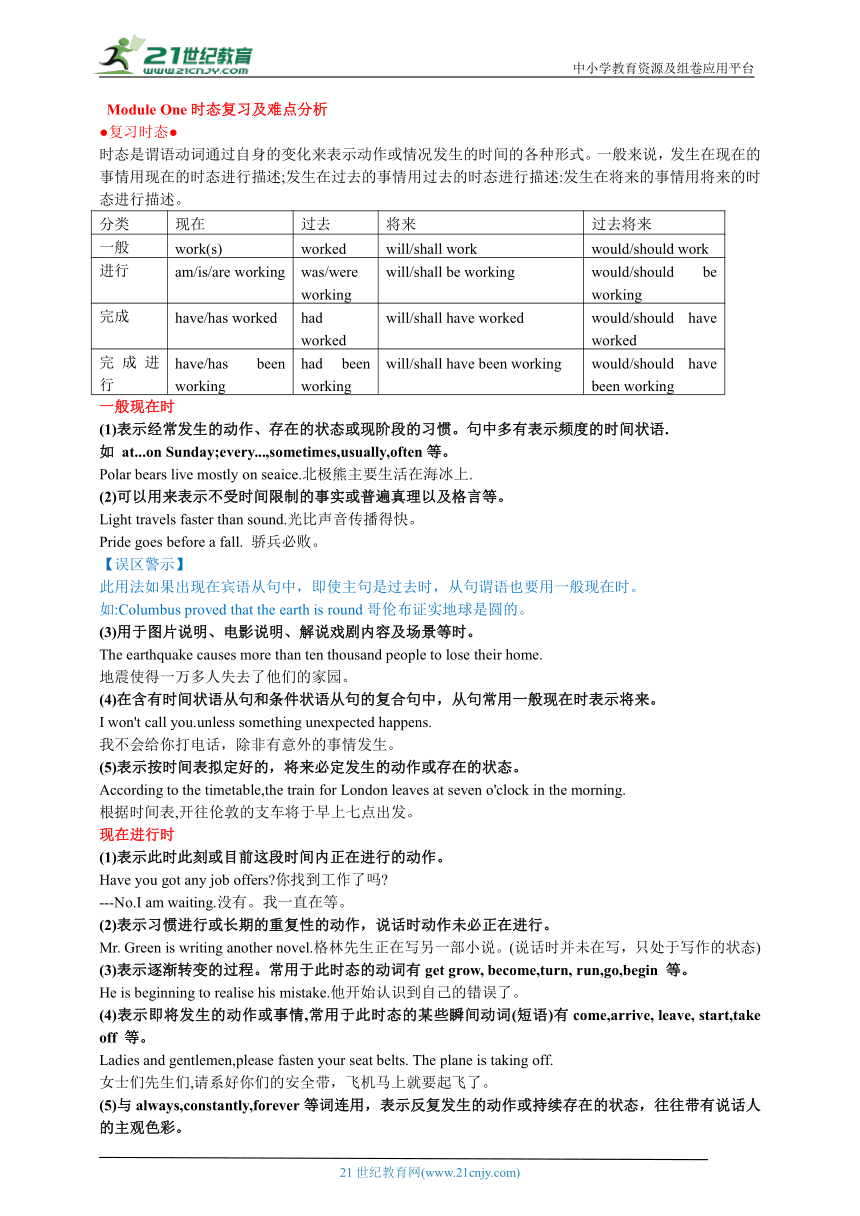 | |
| 格式 | doc | ||
| 文件大小 | 289.0KB | ||
| 资源类型 | 试卷 | ||
| 版本资源 | 外研版(2019) | ||
| 科目 | 英语 | ||
| 更新时间 | 2024-05-06 20:46:42 | ||
图片预览

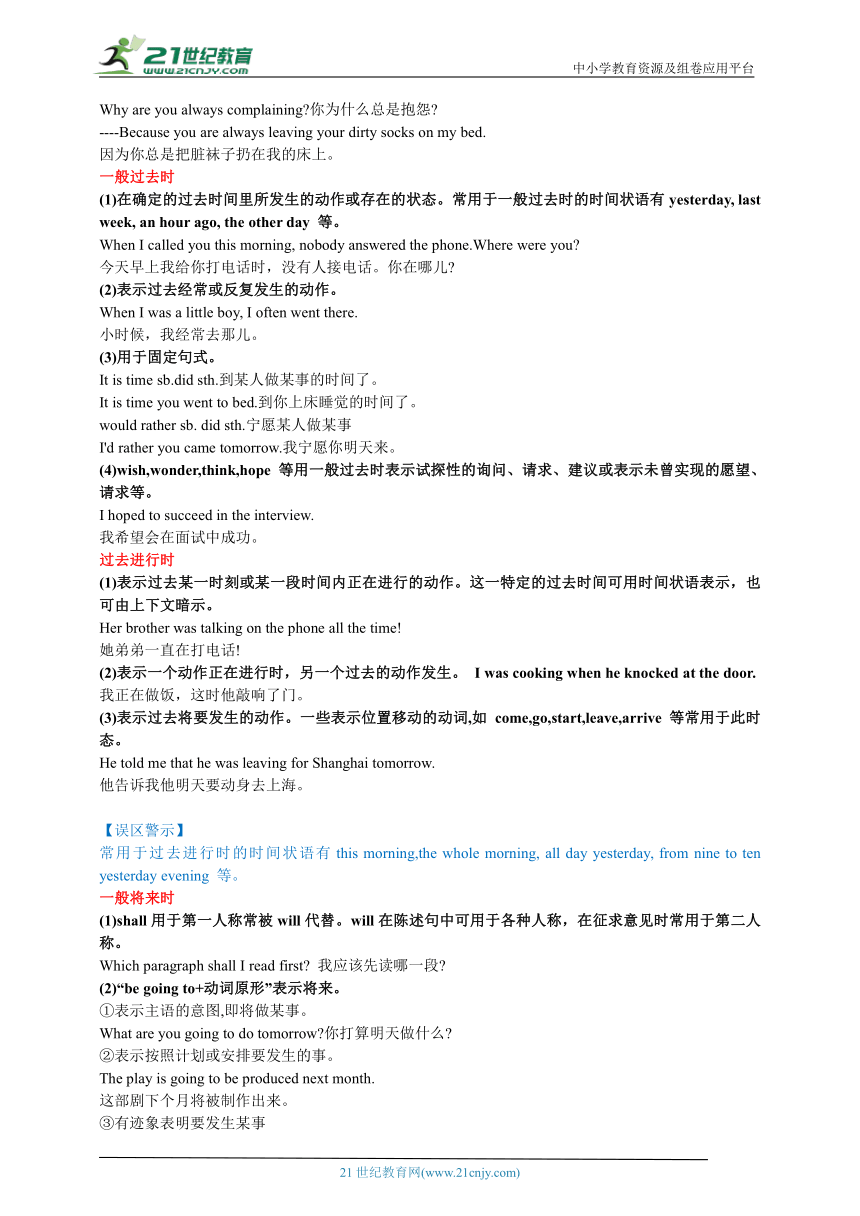
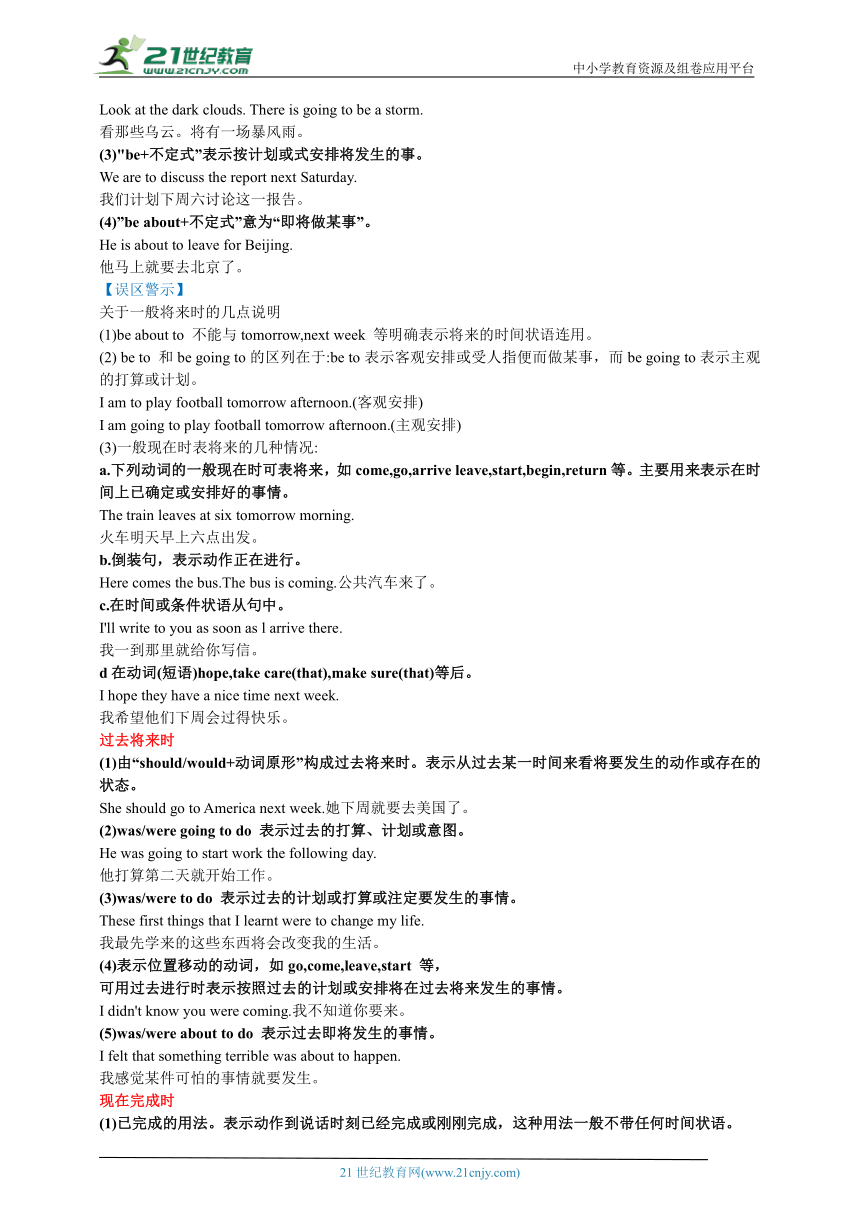
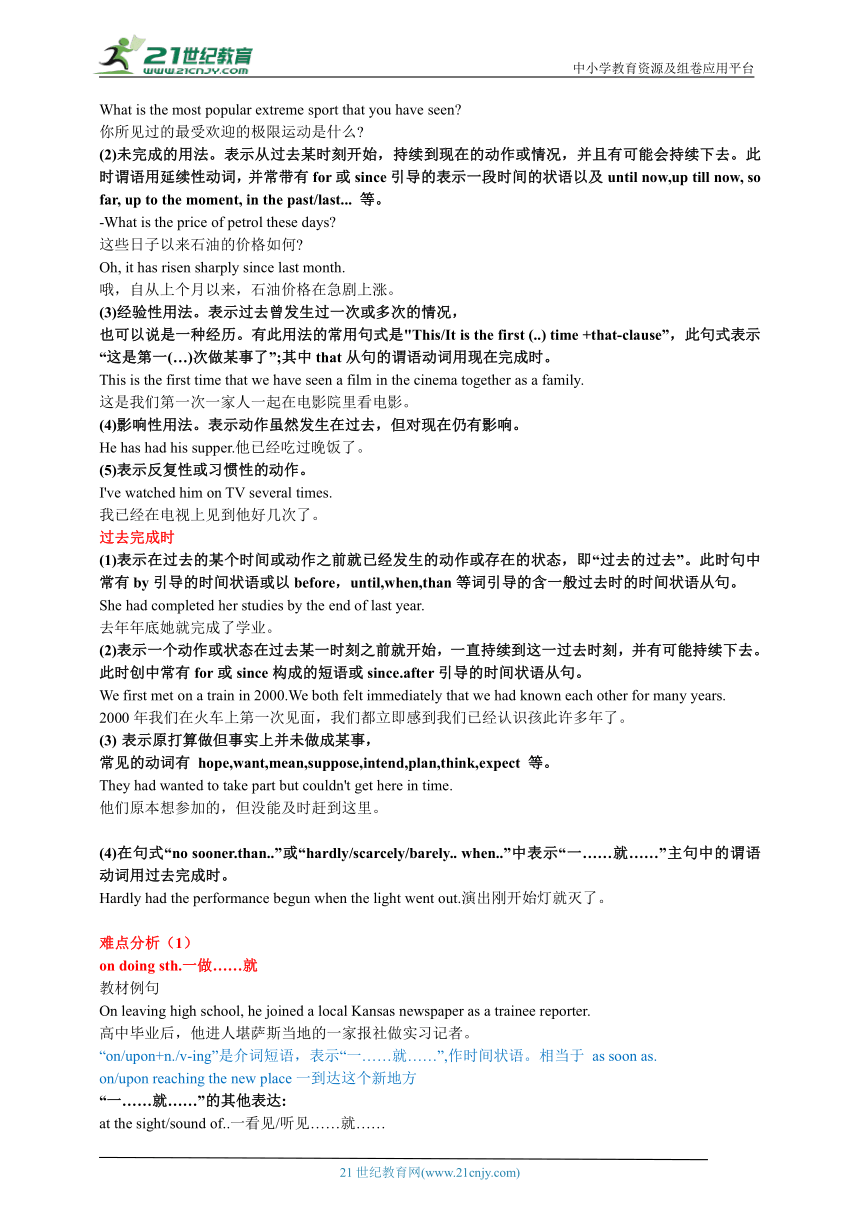
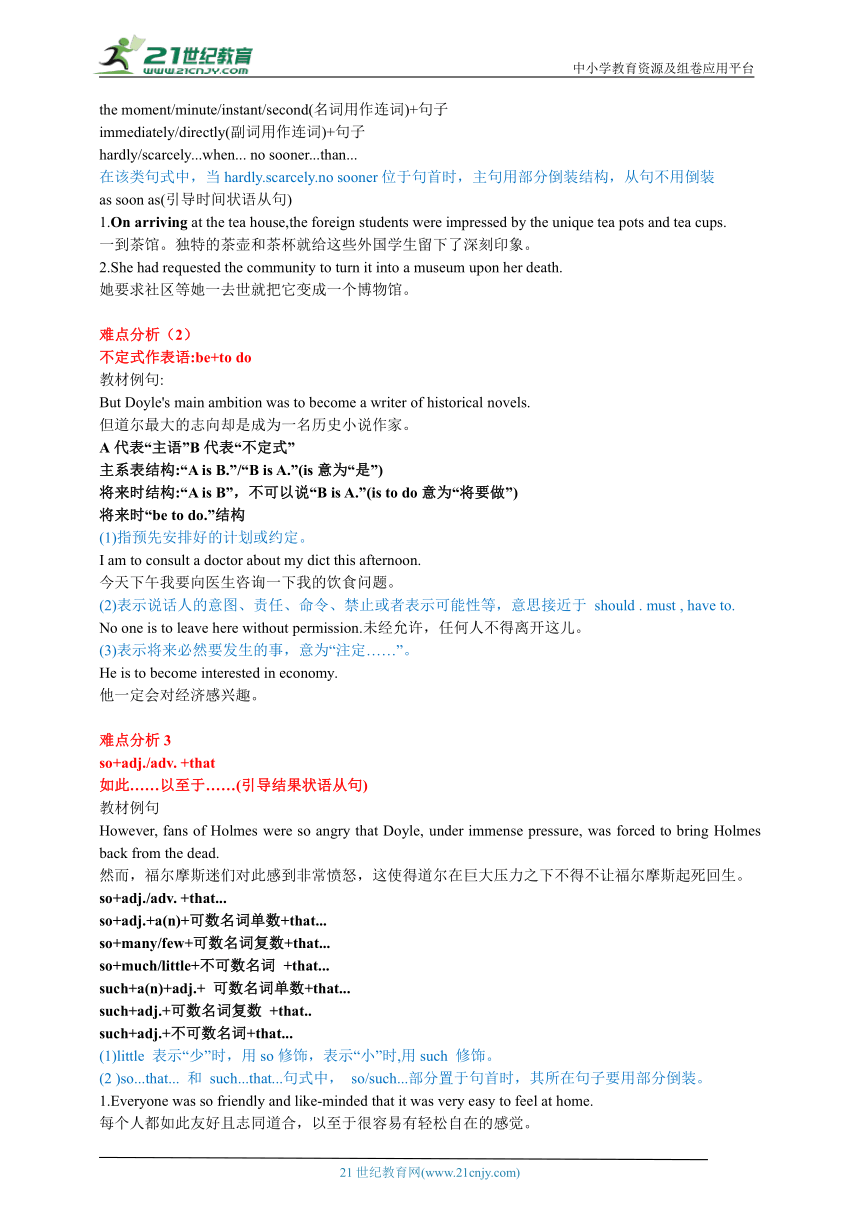
文档简介
中小学教育资源及组卷应用平台
Module One时态复习及难点分析
●复习时态●
时态是谓语动词通过自身的变化来表示动作或情况发生的时间的各种形式。一般来说,发生在现在的事情用现在的时态进行描述;发生在过去的事情用过去的时态进行描述:发生在将来的事情用将来的时态进行描述。
分类 现在 过去 将来 过去将来
一般 work(s) worked will/shall work would/should work
进行 am/is/are working was/were working will/shall be working would/should be working
完成 have/has worked had worked will/shall have worked would/should have worked
完成进行 have/has been working had been working will/shall have been working would/should have been working
一般现在时
(1)表示经常发生的动作、存在的状态或现阶段的习惯。句中多有表示频度的时间状语.
如 at...on Sunday;every...,sometimes,usually,often等。
Polar bears live mostly on seaice.北极熊主要生活在海冰上.
(2)可以用来表示不受时间限制的事实或普遍真理以及格言等。
Light travels faster than sound.光比声音传播得快。
Pride goes before a fall. 骄兵必败。
【误区警示】
此用法如果出现在宾语从句中,即使主句是过去时,从句谓语也要用一般现在时。
如:Columbus proved that the earth is round哥伦布证实地球是圆的。
(3)用于图片说明、电影说明、解说戏剧内容及场景等时。
The earthquake causes more than ten thousand people to lose their home.
地震使得一万多人失去了他们的家园。
(4)在含有时间状语从句和条件状语从句的复合句中,从句常用一般现在时表示将来。
I won't call you.unless something unexpected happens.
我不会给你打电话,除非有意外的事情发生。
(5)表示按时间表拟定好的,将来必定发生的动作或存在的状态。
According to the timetable,the train for London leaves at seven o'clock in the morning.
根据时间表,开往伦敦的支车将于早上七点出发。
现在进行时
(1)表示此时此刻或目前这段时间内正在进行的动作。
Have you got any job offers 你找到工作了吗
---No.I am waiting.没有。我一直在等。
(2)表示习惯进行或长期的重复性的动作,说话时动作未必正在进行。
Mr. Green is writing another novel.格林先生正在写另一部小说。(说话时并未在写,只处于写作的状态)
(3)表示逐渐转变的过程。常用于此时态的动词有get grow, become,turn, run,go,begin 等。
He is beginning to realise his mistake.他开始认识到自己的错误了。
(4)表示即将发生的动作或事情,常用于此时态的某些瞬间动词(短语)有come,arrive, leave, start,take off 等。
Ladies and gentlemen,please fasten your seat belts. The plane is taking off.
女士们先生们,请系好你们的安全带,飞机马上就要起飞了。
(5)与always,constantly,forever等词连用,表示反复发生的动作或持续存在的状态,往往带有说话人的主观色彩。
Why are you always complaining 你为什么总是抱怨
----Because you are always leaving your dirty socks on my bed.
因为你总是把脏袜子扔在我的床上。
一般过去时
(1)在确定的过去时间里所发生的动作或存在的状态。常用于一般过去时的时间状语有yesterday, last week, an hour ago, the other day 等。
When I called you this morning, nobody answered the phone.Where were you
今天早上我给你打电话时,没有人接电话。你在哪儿
(2)表示过去经常或反复发生的动作。
When I was a little boy, I often went there.
小时候,我经常去那儿。
(3)用于固定句式。
It is time sb.did sth.到某人做某事的时间了。
It is time you went to bed.到你上床睡觉的时间了。
would rather sb. did sth.宁愿某人做某事
I'd rather you came tomorrow.我宁愿你明天来。
(4)wish,wonder,think,hope 等用一般过去时表示试探性的询问、请求、建议或表示未曾实现的愿望、请求等。
I hoped to succeed in the interview.
我希望会在面试中成功。
过去进行时
(1)表示过去某一时刻或某一段时间内正在进行的动作。这一特定的过去时间可用时间状语表示,也可由上下文暗示。
Her brother was talking on the phone all the time!
她弟弟一直在打电话!
(2)表示一个动作正在进行时,另一个过去的动作发生。 I was cooking when he knocked at the door.
我正在做饭,这时他敲响了门。
(3)表示过去将要发生的动作。一些表示位置移动的动词,如 come,go,start,leave,arrive 等常用于此时态。
He told me that he was leaving for Shanghai tomorrow.
他告诉我他明天要动身去上海。
【误区警示】
常用于过去进行时的时间状语有this morning,the whole morning, all day yesterday, from nine to ten yesterday evening 等。
一般将来时
(1)shall用于第一人称常被will代替。will在陈述句中可用于各种人称,在征求意见时常用于第二人称。
Which paragraph shall I read first 我应该先读哪一段
(2)“be going to+动词原形”表示将来。
①表示主语的意图,即将做某事。
What are you going to do tomorrow 你打算明天做什么
②表示按照计划或安排要发生的事。
The play is going to be produced next month.
这部剧下个月将被制作出来。
③有迹象表明要发生某事
Look at the dark clouds. There is going to be a storm.
看那些乌云。将有一场暴风雨。
(3)"be+不定式”表示按计划或式安排将发生的事。
We are to discuss the report next Saturday.
我们计划下周六讨论这一报告。
(4)”be about+不定式”意为“即将做某事”。
He is about to leave for Beijing.
他马上就要去北京了。
【误区警示】
关于一般将来时的几点说明
(1)be about to 不能与tomorrow,next week 等明确表示将来的时间状语连用。
(2) be to 和be going to的区列在于:be to表示客观安排或受人指便而做某事,而be going to表示主观的打算或计划。
I am to play football tomorrow afternoon.(客观安排)
I am going to play football tomorrow afternoon.(主观安排)
(3)一般现在时表将来的几种情况:
a.下列动词的一般现在时可表将来,如come,go,arrive leave,start,begin,return等。主要用来表示在时间上已确定或安排好的事情。
The train leaves at six tomorrow morning.
火车明天早上六点出发。
b.倒装句,表示动作正在进行。
Here comes the bus.The bus is coming.公共汽车来了。
c.在时间或条件状语从句中。
I'll write to you as soon as l arrive there.
我一到那里就给你写信。
d在动词(短语)hope,take care(that),make sure(that)等后。
I hope they have a nice time next week.
我希望他们下周会过得快乐。
过去将来时
(1)由“should/would+动词原形”构成过去将来时。表示从过去某一时间来看将要发生的动作或存在的状态。
She should go to America next week.她下周就要去美国了。
(2)was/were going to do 表示过去的打算、计划或意图。
He was going to start work the following day.
他打算第二天就开始工作。
(3)was/were to do 表示过去的计划或打算或注定要发生的事情。
These first things that I learnt were to change my life.
我最先学来的这些东西将会改变我的生活。
(4)表示位置移动的动词,如go,come,leave,start 等,
可用过去进行时表示按照过去的计划或安排将在过去将来发生的事情。
I didn't know you were coming.我不知道你要来。
(5)was/were about to do 表示过去即将发生的事情。
I felt that something terrible was about to happen.
我感觉某件可怕的事情就要发生。
现在完成时
(1)已完成的用法。表示动作到说话时刻已经完成或刚刚完成,这种用法一般不带任何时间状语。
What is the most popular extreme sport that you have seen
你所见过的最受欢迎的极限运动是什么
(2)未完成的用法。表示从过去某时刻开始,持续到现在的动作或情况,并且有可能会持续下去。此时谓语用延续性动词,并常带有for或since引导的表示一段时间的状语以及until now,up till now, so far, up to the moment, in the past/last... 等。
-What is the price of petrol these days
这些日子以来石油的价格如何
Oh, it has risen sharply since last month.
哦,自从上个月以来,石油价格在急剧上涨。
(3)经验性用法。表示过去曾发生过一次或多次的情况,
也可以说是一种经历。有此用法的常用句式是"This/It is the first (..) time +that-clause”,此句式表示“这是第一(…)次做某事了”;其中that从句的谓语动词用现在完成时。
This is the first time that we have seen a film in the cinema together as a family.
这是我们第一次一家人一起在电影院里看电影。
(4)影响性用法。表示动作虽然发生在过去,但对现在仍有影响。
He has had his supper.他已经吃过晚饭了。
(5)表示反复性或习惯性的动作。
I've watched him on TV several times.
我已经在电视上见到他好几次了。
过去完成时
(1)表示在过去的某个时间或动作之前就已经发生的动作或存在的状态,即“过去的过去”。此时句中常有by引导的时间状语或以before,until,when,than等词引导的含一般过去时的时间状语从句。
She had completed her studies by the end of last year.
去年年底她就完成了学业。
(2)表示一个动作或状态在过去某一时刻之前就开始,一直持续到这一过去时刻,并有可能持续下去。此时创中常有for或since构成的短语或since.after引导的时间状语从句。
We first met on a train in 2000.We both felt immediately that we had known each other for many years.
2000年我们在火车上第一次见面,我们都立即感到我们已经认识孩此许多年了。
表示原打算做但事实上并未做成某事,
常见的动词有 hope,want,mean,suppose,intend,plan,think,expect 等。
They had wanted to take part but couldn't get here in time.
他们原本想参加的,但没能及时赶到这里。
(4)在句式“no sooner.than..”或“hardly/scarcely/barely.. when..”中表示“一……就……”主句中的谓语动词用过去完成时。
Hardly had the performance begun when the light went out.演出刚开始灯就灭了。
难点分析(1)
on doing sth.一做……就
教材例句
On leaving high school, he joined a local Kansas newspaper as a trainee reporter.
高中毕业后,他进人堪萨斯当地的一家报社做实习记者。
“on/upon+n./v-ing”是介词短语,表示“一……就……”,作时间状语。相当于 as soon as.
on/upon reaching the new place一到达这个新地方
“一……就……”的其他表达:
at the sight/sound of..一看见/听见……就……
the moment/minute/instant/second(名词用作连词)+句子
immediately/directly(副词用作连词)+句子
hardly/scarcely...when... no sooner...than...
在该类句式中,当hardly.scarcely.no sooner位于句首时,主句用部分倒装结构,从句不用倒装
as soon as(引导时间状语从句)
1.On arriving at the tea house,the foreign students were impressed by the unique tea pots and tea cups.
一到茶馆。独特的茶壶和茶杯就给这些外国学生留下了深刻印象。
2.She had requested the community to turn it into a museum upon her death.
她要求社区等她一去世就把它变成一个博物馆。
难点分析(2)
不定式作表语:be+to do
教材例句:
But Doyle's main ambition was to become a writer of historical novels.
但道尔最大的志向却是成为一名历史小说作家。
A代表“主语”B代表“不定式”
主系表结构:“A is B.”/“B is A.”(is意为“是”)
将来时结构:“A is B”,不可以说“B is A.”(is to do意为“将要做”)
将来时“be to do.”结构
(1)指预先安排好的计划或约定。
I am to consult a doctor about my dict this afternoon.
今天下午我要向医生咨询一下我的饮食问题。
(2)表示说话人的意图、责任、命令、禁止或者表示可能性等,意思接近于 should . must , have to.
No one is to leave here without permission.未经允许,任何人不得离开这儿。
(3)表示将来必然要发生的事,意为“注定……”。
He is to become interested in economy.
他一定会对经济感兴趣。
难点分析3
so+adj./adv. +that
如此……以至于……(引导结果状语从句)
教材例句
However, fans of Holmes were so angry that Doyle, under immense pressure, was forced to bring Holmes back from the dead.
然而,福尔摩斯迷们对此感到非常愤怒,这使得道尔在巨大压力之下不得不让福尔摩斯起死回生。
so+adj./adv. +that...
so+adj.+a(n)+可数名词单数+that...
so+many/few+可数名词复数+that...
so+much/little+不可数名词 +that...
such+a(n)+adj.+ 可数名词单数+that...
such+adj.+可数名词复数 +that..
such+adj.+不可数名词+that...
(1)little 表示“少”时,用so修饰,表示“小”时,用such 修饰。
(2 )so...that... 和 such...that...句式中, so/such...部分置于句首时,其所在句子要用部分倒装。
1.Everyone was so friendly and like-minded that it was very easy to feel at home.
每个人都如此友好且志同道合,以至于很容易有轻松自在的感觉。
2.Scientists in Louisiana were so concerned that they decided to pay hunters $5 a tail.
路易斯安那州的科学家们对此非常担心,因此他们决定每条尾巴支付给猎人5美元。
难点分析4
状语从句的省略
教材例句
What would you do when faced with a difficult decision
当你面临一个艰难的决定时,你会做什么
when faced with... 相当于 when you were faced with...是状语从句的省略
当时间、条件、让步、方式等状语从句的主语与主句主语一致(或者从句主语是it),且从句谓语含有be动词时,可以将从句的主语和be动词一起省略。
If (it is) possible,he will help you out of the difficulty.
如果可能的话,他会帮你摆脱困境。
已转化为固定用法的省略
if possible如果可能的话 if necessary如有必要 if not 如果不
when necessary必要的时候 where necessary在必要的地方
where appropriate 在适合的地方
She decided to o back to college to advance her career and to be able to better support her family while doing something she loves:nursing.
她决定回到大学去发展自己的事业,并在做自己喜欢的事情--护理的同时能更好地养家糊口。
难点分析5
动名词(短语)作主语
教材例句:
I thought quitting my old job to work here was the right decision to make, but now I'm not sure---the new job seems too demanding
我原以为辞掉原来的工作到这里工作是一个做的正确的决定,但现在我不确定了--新工作似乎要求太高了。
(1)动名词(短语)作主语一般表示经常性、习惯性的动作。
(2)单个动名词(短语)作主语时,谓语用第三人称单数形式。
(3)动名词(短语)作主语时,有时用it作形式主语,而把动名词(短语)后置。
It is no use/good doing sth.做某事是没有用/好处的。
It is a waste of time doing sth.做某事是浪费时间的。
It is worth doing sth.做某事是值得的。
不定式作主语经常被用来表示具体的某一次的行为或将来的动作,强调动作本身。
To finish the task will take a long time.
要完成这项任务将花费很长一段时间。
①Living on the tree has been inspiring.住在树上很鼓舞人心。
②Watering young plants in the dry season was tough for a lone boy.
在旱季给小树浇水对独自一个人干活的男孩来说是很困难的。
③To say is one thing; to do is another.
说是一回事,做是另一回事。
难点分析6
lt + be + adl +for sb.+to do sth.
教材例句:
It is crucial for teenagers to develop into mature and responsible members of society.
对青少年来说,成长为成熟的、有责任感的社会成员是至关重要的
"It+be+adj.(+for/of sb.)+不定式"是固定句式,该句式中,it为形式主语。动词不定式作真正的主语。
该句式中 of与for的选择与其前的形容词有关:
→与事物的特证有关
"easy,difficult,hard, important,necessary,quick 等+for
→与人的品格或品质有关
kind.wise,cruel,foolish 等+of
1.However,organic consumers argue it is better to be safe than sorry.
然而.有机食品消费者认为安全总比后悔好。
2.It is traditional to bring a gift to a housewarming party. 带礼物参加乔迁派对是一种传统。
难点分析(7)
cannot help but do...不得不做某事;忍不住做某事
教材例句
When reading The Road Not Taken. one cannot help but see in one's mind images of a peaceful wood deep within the countryside.
阅读《未选择的路》总会让人脑海中不禁浮现出乡村深处静谧的树林。
cannot help doing sth.(=cannot help but do sth.)禁不住做某事
cannot help(to)do sth.不能帮助做某事
help sb.out帮某人解决难题或摆脱困境
help oneself to(口)自用(食物)
with the help of在……的帮助下
help sb.(to)do sth.帮某人(做)某事
help sb.with sth.帮某人(做)某事
be of little help 没有多大帮助
be of great help 非常有帮助
It can't be helped.那是没办法/不可避免的事。
1.As he writes in his new book,A Long Way Home,Breriey couldn't help but wonder about his hometown back m India.
在他的新书《回家的漫漫长路》中,布瑞尔利不禁对他在印度的家乡感到好奇。
2.Lack of self-confidence is his Achilles‘heel,I am afraid.
恐怕缺乏自信是他的致命弱点。
难点分析(8)
it's unlikely that...不太可能……
教材例句
...he knows it's unlikely that he will ever have the opportunity to do so.……
他也知道获得这种机会的可能性微乎其微。
It's likely that...很可能……
It's more likely/unlikely that...更可能/更不可能……
Not likely!绝对不可能!/才不呢!(表示坚决不同意)
be likely/unlikely to do sth很可能/不可能做某事
in the unlikely event of万一…
1. He is ill seriously so that it's unlikely that he will attend the party.
他病得很严重,所以他不可能参加这个聚会.
难点分析(9)
too...to...太……而不能……(常表示否定意义)
教材例句
To me,it is really about accepting the consequences of our choices many years in the future, when it is too late to change them.
对我来说,它表达的真实意思是接受多年以后我们当初的选择所带来的后果,那时再去改变它们就太晚了。
(1)too...to...结构有时可与not...enough to...或so...that...相互转换。
He was too weak to walk.
=He was not strong enough to walk.
=He was so weak that he could not walk.
他身体太弱了,不能走路。
(2)当句子主语不是不定式的逻辑主语时,可在不定式前加上for sb.引出逻辑主语。
The box was too heavy for me to lift.
箱子太重,我举不起来。
too...to...结构在下列情况下表示肯定意义:
①too...to...结构中含有not,never等否定词时;
②too之前有only,simply,just 等词时;
③当too后的形容词表示心理状态或是描述性形容词时,如anxious。 eager, glad, pleased, easy, kind 等。
①She was too upset to spend much time at the real museum.
她心烦意乱,没法在真正的博物馆花太多时间。
②Nothing is too small to celebrate.再小的事也值得庆祝。
④...it's never too early to make necessary preparations for a healthy and meaningful college experience.……
为一次健康和有意义的大学经历做必要的准备永远不会太早。
make preparations for为做准备
⑤ I'm only too delighted to accept your invitation.
我非常高兴接受你的邀请。
⑥ She is too anxious to leave,她急于离开。
本单元词组
1.in the face of 面对...
2.be forced to do 被迫做...
3.pass up 放过;放弃;错过(机会)
4.put off 推迟...;使...延期
5.weigh up 仔细考虑;权衡
6.yours sincerely 谨上;敬上;谨启
7.on a daily basis 每天;每日
8.for instance 例如
9.instead of 代替;而不是
10.take action 采取行动
11.make up one’s mind 做出决定;拿定主意
12.have second thoughts (对原先的决定)犹豫;产生怀疑
13.reject...out of hand 坚决拒绝....;彻底否定...
14.arise from 起因于...
15.turn down 拒绝;调低(声音等)
16.be about to do sth.即将做某事
e one’s way 发生在某人身上
18.in place 在正确位置;准备就绪
19.in this respect 在这个方面;就这一点来说
20.by contrast 相比之下;与之相比
21.devote...to...把...奉献给...
22.long to do sth.渴望做某事
23.get enough of 获取足够的...;满足于...
24.kill off 消灭;杀死;扼杀;排除;使停止
25.focus on/upon 专注于;集中精力于
26.turn out 证明是;结果是;结果...
27.take a leaf out of/from one’s book 效仿;模仿(成功之人的举止和行为)
28.at drawn 拂晓时;黎明时
29.apply for 申请
30.due to 由于
31.make all the difference 迥然不同;关系重大
32.an insight into 对...的理解;洞察
33.range from...to 从...到...变化
34.have...in common 有...共同之处
35.make the most of 尽量利用;充分利用
36.with regret 带有遗憾地
37.as opposed to (表示对比)而,相对于
38.live...to the full 充实地度过
39.be familiar with 对...熟悉(表示状态)
40.major in 主修
41.have the opportunity to 有机会
42.with a sigh随着一声叹息
43.be suitable for适合
44.look back to回首;回顾
45.too late to来不及
46.in more detail更详细地
47.participate in参与
48.free admission入场免费;赠送票
49.out of hand失控;不假思索
21世纪教育网 www.21cnjy.com 精品试卷·第 2 页 (共 2 页)
21世纪教育网(www.21cnjy.com)
Module One时态复习及难点分析
●复习时态●
时态是谓语动词通过自身的变化来表示动作或情况发生的时间的各种形式。一般来说,发生在现在的事情用现在的时态进行描述;发生在过去的事情用过去的时态进行描述:发生在将来的事情用将来的时态进行描述。
分类 现在 过去 将来 过去将来
一般 work(s) worked will/shall work would/should work
进行 am/is/are working was/were working will/shall be working would/should be working
完成 have/has worked had worked will/shall have worked would/should have worked
完成进行 have/has been working had been working will/shall have been working would/should have been working
一般现在时
(1)表示经常发生的动作、存在的状态或现阶段的习惯。句中多有表示频度的时间状语.
如 at...on Sunday;every...,sometimes,usually,often等。
Polar bears live mostly on seaice.北极熊主要生活在海冰上.
(2)可以用来表示不受时间限制的事实或普遍真理以及格言等。
Light travels faster than sound.光比声音传播得快。
Pride goes before a fall. 骄兵必败。
【误区警示】
此用法如果出现在宾语从句中,即使主句是过去时,从句谓语也要用一般现在时。
如:Columbus proved that the earth is round哥伦布证实地球是圆的。
(3)用于图片说明、电影说明、解说戏剧内容及场景等时。
The earthquake causes more than ten thousand people to lose their home.
地震使得一万多人失去了他们的家园。
(4)在含有时间状语从句和条件状语从句的复合句中,从句常用一般现在时表示将来。
I won't call you.unless something unexpected happens.
我不会给你打电话,除非有意外的事情发生。
(5)表示按时间表拟定好的,将来必定发生的动作或存在的状态。
According to the timetable,the train for London leaves at seven o'clock in the morning.
根据时间表,开往伦敦的支车将于早上七点出发。
现在进行时
(1)表示此时此刻或目前这段时间内正在进行的动作。
Have you got any job offers 你找到工作了吗
---No.I am waiting.没有。我一直在等。
(2)表示习惯进行或长期的重复性的动作,说话时动作未必正在进行。
Mr. Green is writing another novel.格林先生正在写另一部小说。(说话时并未在写,只处于写作的状态)
(3)表示逐渐转变的过程。常用于此时态的动词有get grow, become,turn, run,go,begin 等。
He is beginning to realise his mistake.他开始认识到自己的错误了。
(4)表示即将发生的动作或事情,常用于此时态的某些瞬间动词(短语)有come,arrive, leave, start,take off 等。
Ladies and gentlemen,please fasten your seat belts. The plane is taking off.
女士们先生们,请系好你们的安全带,飞机马上就要起飞了。
(5)与always,constantly,forever等词连用,表示反复发生的动作或持续存在的状态,往往带有说话人的主观色彩。
Why are you always complaining 你为什么总是抱怨
----Because you are always leaving your dirty socks on my bed.
因为你总是把脏袜子扔在我的床上。
一般过去时
(1)在确定的过去时间里所发生的动作或存在的状态。常用于一般过去时的时间状语有yesterday, last week, an hour ago, the other day 等。
When I called you this morning, nobody answered the phone.Where were you
今天早上我给你打电话时,没有人接电话。你在哪儿
(2)表示过去经常或反复发生的动作。
When I was a little boy, I often went there.
小时候,我经常去那儿。
(3)用于固定句式。
It is time sb.did sth.到某人做某事的时间了。
It is time you went to bed.到你上床睡觉的时间了。
would rather sb. did sth.宁愿某人做某事
I'd rather you came tomorrow.我宁愿你明天来。
(4)wish,wonder,think,hope 等用一般过去时表示试探性的询问、请求、建议或表示未曾实现的愿望、请求等。
I hoped to succeed in the interview.
我希望会在面试中成功。
过去进行时
(1)表示过去某一时刻或某一段时间内正在进行的动作。这一特定的过去时间可用时间状语表示,也可由上下文暗示。
Her brother was talking on the phone all the time!
她弟弟一直在打电话!
(2)表示一个动作正在进行时,另一个过去的动作发生。 I was cooking when he knocked at the door.
我正在做饭,这时他敲响了门。
(3)表示过去将要发生的动作。一些表示位置移动的动词,如 come,go,start,leave,arrive 等常用于此时态。
He told me that he was leaving for Shanghai tomorrow.
他告诉我他明天要动身去上海。
【误区警示】
常用于过去进行时的时间状语有this morning,the whole morning, all day yesterday, from nine to ten yesterday evening 等。
一般将来时
(1)shall用于第一人称常被will代替。will在陈述句中可用于各种人称,在征求意见时常用于第二人称。
Which paragraph shall I read first 我应该先读哪一段
(2)“be going to+动词原形”表示将来。
①表示主语的意图,即将做某事。
What are you going to do tomorrow 你打算明天做什么
②表示按照计划或安排要发生的事。
The play is going to be produced next month.
这部剧下个月将被制作出来。
③有迹象表明要发生某事
Look at the dark clouds. There is going to be a storm.
看那些乌云。将有一场暴风雨。
(3)"be+不定式”表示按计划或式安排将发生的事。
We are to discuss the report next Saturday.
我们计划下周六讨论这一报告。
(4)”be about+不定式”意为“即将做某事”。
He is about to leave for Beijing.
他马上就要去北京了。
【误区警示】
关于一般将来时的几点说明
(1)be about to 不能与tomorrow,next week 等明确表示将来的时间状语连用。
(2) be to 和be going to的区列在于:be to表示客观安排或受人指便而做某事,而be going to表示主观的打算或计划。
I am to play football tomorrow afternoon.(客观安排)
I am going to play football tomorrow afternoon.(主观安排)
(3)一般现在时表将来的几种情况:
a.下列动词的一般现在时可表将来,如come,go,arrive leave,start,begin,return等。主要用来表示在时间上已确定或安排好的事情。
The train leaves at six tomorrow morning.
火车明天早上六点出发。
b.倒装句,表示动作正在进行。
Here comes the bus.The bus is coming.公共汽车来了。
c.在时间或条件状语从句中。
I'll write to you as soon as l arrive there.
我一到那里就给你写信。
d在动词(短语)hope,take care(that),make sure(that)等后。
I hope they have a nice time next week.
我希望他们下周会过得快乐。
过去将来时
(1)由“should/would+动词原形”构成过去将来时。表示从过去某一时间来看将要发生的动作或存在的状态。
She should go to America next week.她下周就要去美国了。
(2)was/were going to do 表示过去的打算、计划或意图。
He was going to start work the following day.
他打算第二天就开始工作。
(3)was/were to do 表示过去的计划或打算或注定要发生的事情。
These first things that I learnt were to change my life.
我最先学来的这些东西将会改变我的生活。
(4)表示位置移动的动词,如go,come,leave,start 等,
可用过去进行时表示按照过去的计划或安排将在过去将来发生的事情。
I didn't know you were coming.我不知道你要来。
(5)was/were about to do 表示过去即将发生的事情。
I felt that something terrible was about to happen.
我感觉某件可怕的事情就要发生。
现在完成时
(1)已完成的用法。表示动作到说话时刻已经完成或刚刚完成,这种用法一般不带任何时间状语。
What is the most popular extreme sport that you have seen
你所见过的最受欢迎的极限运动是什么
(2)未完成的用法。表示从过去某时刻开始,持续到现在的动作或情况,并且有可能会持续下去。此时谓语用延续性动词,并常带有for或since引导的表示一段时间的状语以及until now,up till now, so far, up to the moment, in the past/last... 等。
-What is the price of petrol these days
这些日子以来石油的价格如何
Oh, it has risen sharply since last month.
哦,自从上个月以来,石油价格在急剧上涨。
(3)经验性用法。表示过去曾发生过一次或多次的情况,
也可以说是一种经历。有此用法的常用句式是"This/It is the first (..) time +that-clause”,此句式表示“这是第一(…)次做某事了”;其中that从句的谓语动词用现在完成时。
This is the first time that we have seen a film in the cinema together as a family.
这是我们第一次一家人一起在电影院里看电影。
(4)影响性用法。表示动作虽然发生在过去,但对现在仍有影响。
He has had his supper.他已经吃过晚饭了。
(5)表示反复性或习惯性的动作。
I've watched him on TV several times.
我已经在电视上见到他好几次了。
过去完成时
(1)表示在过去的某个时间或动作之前就已经发生的动作或存在的状态,即“过去的过去”。此时句中常有by引导的时间状语或以before,until,when,than等词引导的含一般过去时的时间状语从句。
She had completed her studies by the end of last year.
去年年底她就完成了学业。
(2)表示一个动作或状态在过去某一时刻之前就开始,一直持续到这一过去时刻,并有可能持续下去。此时创中常有for或since构成的短语或since.after引导的时间状语从句。
We first met on a train in 2000.We both felt immediately that we had known each other for many years.
2000年我们在火车上第一次见面,我们都立即感到我们已经认识孩此许多年了。
表示原打算做但事实上并未做成某事,
常见的动词有 hope,want,mean,suppose,intend,plan,think,expect 等。
They had wanted to take part but couldn't get here in time.
他们原本想参加的,但没能及时赶到这里。
(4)在句式“no sooner.than..”或“hardly/scarcely/barely.. when..”中表示“一……就……”主句中的谓语动词用过去完成时。
Hardly had the performance begun when the light went out.演出刚开始灯就灭了。
难点分析(1)
on doing sth.一做……就
教材例句
On leaving high school, he joined a local Kansas newspaper as a trainee reporter.
高中毕业后,他进人堪萨斯当地的一家报社做实习记者。
“on/upon+n./v-ing”是介词短语,表示“一……就……”,作时间状语。相当于 as soon as.
on/upon reaching the new place一到达这个新地方
“一……就……”的其他表达:
at the sight/sound of..一看见/听见……就……
the moment/minute/instant/second(名词用作连词)+句子
immediately/directly(副词用作连词)+句子
hardly/scarcely...when... no sooner...than...
在该类句式中,当hardly.scarcely.no sooner位于句首时,主句用部分倒装结构,从句不用倒装
as soon as(引导时间状语从句)
1.On arriving at the tea house,the foreign students were impressed by the unique tea pots and tea cups.
一到茶馆。独特的茶壶和茶杯就给这些外国学生留下了深刻印象。
2.She had requested the community to turn it into a museum upon her death.
她要求社区等她一去世就把它变成一个博物馆。
难点分析(2)
不定式作表语:be+to do
教材例句:
But Doyle's main ambition was to become a writer of historical novels.
但道尔最大的志向却是成为一名历史小说作家。
A代表“主语”B代表“不定式”
主系表结构:“A is B.”/“B is A.”(is意为“是”)
将来时结构:“A is B”,不可以说“B is A.”(is to do意为“将要做”)
将来时“be to do.”结构
(1)指预先安排好的计划或约定。
I am to consult a doctor about my dict this afternoon.
今天下午我要向医生咨询一下我的饮食问题。
(2)表示说话人的意图、责任、命令、禁止或者表示可能性等,意思接近于 should . must , have to.
No one is to leave here without permission.未经允许,任何人不得离开这儿。
(3)表示将来必然要发生的事,意为“注定……”。
He is to become interested in economy.
他一定会对经济感兴趣。
难点分析3
so+adj./adv. +that
如此……以至于……(引导结果状语从句)
教材例句
However, fans of Holmes were so angry that Doyle, under immense pressure, was forced to bring Holmes back from the dead.
然而,福尔摩斯迷们对此感到非常愤怒,这使得道尔在巨大压力之下不得不让福尔摩斯起死回生。
so+adj./adv. +that...
so+adj.+a(n)+可数名词单数+that...
so+many/few+可数名词复数+that...
so+much/little+不可数名词 +that...
such+a(n)+adj.+ 可数名词单数+that...
such+adj.+可数名词复数 +that..
such+adj.+不可数名词+that...
(1)little 表示“少”时,用so修饰,表示“小”时,用such 修饰。
(2 )so...that... 和 such...that...句式中, so/such...部分置于句首时,其所在句子要用部分倒装。
1.Everyone was so friendly and like-minded that it was very easy to feel at home.
每个人都如此友好且志同道合,以至于很容易有轻松自在的感觉。
2.Scientists in Louisiana were so concerned that they decided to pay hunters $5 a tail.
路易斯安那州的科学家们对此非常担心,因此他们决定每条尾巴支付给猎人5美元。
难点分析4
状语从句的省略
教材例句
What would you do when faced with a difficult decision
当你面临一个艰难的决定时,你会做什么
when faced with... 相当于 when you were faced with...是状语从句的省略
当时间、条件、让步、方式等状语从句的主语与主句主语一致(或者从句主语是it),且从句谓语含有be动词时,可以将从句的主语和be动词一起省略。
If (it is) possible,he will help you out of the difficulty.
如果可能的话,他会帮你摆脱困境。
已转化为固定用法的省略
if possible如果可能的话 if necessary如有必要 if not 如果不
when necessary必要的时候 where necessary在必要的地方
where appropriate 在适合的地方
She decided to o back to college to advance her career and to be able to better support her family while doing something she loves:nursing.
她决定回到大学去发展自己的事业,并在做自己喜欢的事情--护理的同时能更好地养家糊口。
难点分析5
动名词(短语)作主语
教材例句:
I thought quitting my old job to work here was the right decision to make, but now I'm not sure---the new job seems too demanding
我原以为辞掉原来的工作到这里工作是一个做的正确的决定,但现在我不确定了--新工作似乎要求太高了。
(1)动名词(短语)作主语一般表示经常性、习惯性的动作。
(2)单个动名词(短语)作主语时,谓语用第三人称单数形式。
(3)动名词(短语)作主语时,有时用it作形式主语,而把动名词(短语)后置。
It is no use/good doing sth.做某事是没有用/好处的。
It is a waste of time doing sth.做某事是浪费时间的。
It is worth doing sth.做某事是值得的。
不定式作主语经常被用来表示具体的某一次的行为或将来的动作,强调动作本身。
To finish the task will take a long time.
要完成这项任务将花费很长一段时间。
①Living on the tree has been inspiring.住在树上很鼓舞人心。
②Watering young plants in the dry season was tough for a lone boy.
在旱季给小树浇水对独自一个人干活的男孩来说是很困难的。
③To say is one thing; to do is another.
说是一回事,做是另一回事。
难点分析6
lt + be + adl +for sb.+to do sth.
教材例句:
It is crucial for teenagers to develop into mature and responsible members of society.
对青少年来说,成长为成熟的、有责任感的社会成员是至关重要的
"It+be+adj.(+for/of sb.)+不定式"是固定句式,该句式中,it为形式主语。动词不定式作真正的主语。
该句式中 of与for的选择与其前的形容词有关:
→与事物的特证有关
"easy,difficult,hard, important,necessary,quick 等+for
→与人的品格或品质有关
kind.wise,cruel,foolish 等+of
1.However,organic consumers argue it is better to be safe than sorry.
然而.有机食品消费者认为安全总比后悔好。
2.It is traditional to bring a gift to a housewarming party. 带礼物参加乔迁派对是一种传统。
难点分析(7)
cannot help but do...不得不做某事;忍不住做某事
教材例句
When reading The Road Not Taken. one cannot help but see in one's mind images of a peaceful wood deep within the countryside.
阅读《未选择的路》总会让人脑海中不禁浮现出乡村深处静谧的树林。
cannot help doing sth.(=cannot help but do sth.)禁不住做某事
cannot help(to)do sth.不能帮助做某事
help sb.out帮某人解决难题或摆脱困境
help oneself to(口)自用(食物)
with the help of在……的帮助下
help sb.(to)do sth.帮某人(做)某事
help sb.with sth.帮某人(做)某事
be of little help 没有多大帮助
be of great help 非常有帮助
It can't be helped.那是没办法/不可避免的事。
1.As he writes in his new book,A Long Way Home,Breriey couldn't help but wonder about his hometown back m India.
在他的新书《回家的漫漫长路》中,布瑞尔利不禁对他在印度的家乡感到好奇。
2.Lack of self-confidence is his Achilles‘heel,I am afraid.
恐怕缺乏自信是他的致命弱点。
难点分析(8)
it's unlikely that...不太可能……
教材例句
...he knows it's unlikely that he will ever have the opportunity to do so.……
他也知道获得这种机会的可能性微乎其微。
It's likely that...很可能……
It's more likely/unlikely that...更可能/更不可能……
Not likely!绝对不可能!/才不呢!(表示坚决不同意)
be likely/unlikely to do sth很可能/不可能做某事
in the unlikely event of万一…
1. He is ill seriously so that it's unlikely that he will attend the party.
他病得很严重,所以他不可能参加这个聚会.
难点分析(9)
too...to...太……而不能……(常表示否定意义)
教材例句
To me,it is really about accepting the consequences of our choices many years in the future, when it is too late to change them.
对我来说,它表达的真实意思是接受多年以后我们当初的选择所带来的后果,那时再去改变它们就太晚了。
(1)too...to...结构有时可与not...enough to...或so...that...相互转换。
He was too weak to walk.
=He was not strong enough to walk.
=He was so weak that he could not walk.
他身体太弱了,不能走路。
(2)当句子主语不是不定式的逻辑主语时,可在不定式前加上for sb.引出逻辑主语。
The box was too heavy for me to lift.
箱子太重,我举不起来。
too...to...结构在下列情况下表示肯定意义:
①too...to...结构中含有not,never等否定词时;
②too之前有only,simply,just 等词时;
③当too后的形容词表示心理状态或是描述性形容词时,如anxious。 eager, glad, pleased, easy, kind 等。
①She was too upset to spend much time at the real museum.
她心烦意乱,没法在真正的博物馆花太多时间。
②Nothing is too small to celebrate.再小的事也值得庆祝。
④...it's never too early to make necessary preparations for a healthy and meaningful college experience.……
为一次健康和有意义的大学经历做必要的准备永远不会太早。
make preparations for为做准备
⑤ I'm only too delighted to accept your invitation.
我非常高兴接受你的邀请。
⑥ She is too anxious to leave,她急于离开。
本单元词组
1.in the face of 面对...
2.be forced to do 被迫做...
3.pass up 放过;放弃;错过(机会)
4.put off 推迟...;使...延期
5.weigh up 仔细考虑;权衡
6.yours sincerely 谨上;敬上;谨启
7.on a daily basis 每天;每日
8.for instance 例如
9.instead of 代替;而不是
10.take action 采取行动
11.make up one’s mind 做出决定;拿定主意
12.have second thoughts (对原先的决定)犹豫;产生怀疑
13.reject...out of hand 坚决拒绝....;彻底否定...
14.arise from 起因于...
15.turn down 拒绝;调低(声音等)
16.be about to do sth.即将做某事
e one’s way 发生在某人身上
18.in place 在正确位置;准备就绪
19.in this respect 在这个方面;就这一点来说
20.by contrast 相比之下;与之相比
21.devote...to...把...奉献给...
22.long to do sth.渴望做某事
23.get enough of 获取足够的...;满足于...
24.kill off 消灭;杀死;扼杀;排除;使停止
25.focus on/upon 专注于;集中精力于
26.turn out 证明是;结果是;结果...
27.take a leaf out of/from one’s book 效仿;模仿(成功之人的举止和行为)
28.at drawn 拂晓时;黎明时
29.apply for 申请
30.due to 由于
31.make all the difference 迥然不同;关系重大
32.an insight into 对...的理解;洞察
33.range from...to 从...到...变化
34.have...in common 有...共同之处
35.make the most of 尽量利用;充分利用
36.with regret 带有遗憾地
37.as opposed to (表示对比)而,相对于
38.live...to the full 充实地度过
39.be familiar with 对...熟悉(表示状态)
40.major in 主修
41.have the opportunity to 有机会
42.with a sigh随着一声叹息
43.be suitable for适合
44.look back to回首;回顾
45.too late to来不及
46.in more detail更详细地
47.participate in参与
48.free admission入场免费;赠送票
49.out of hand失控;不假思索
21世纪教育网 www.21cnjy.com 精品试卷·第 2 页 (共 2 页)
21世纪教育网(www.21cnjy.com)
